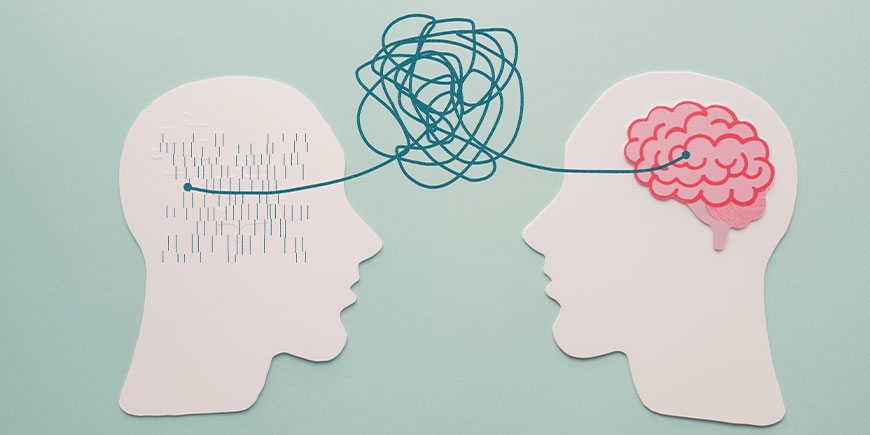Artificial intelligence and psychology – when technology comes face to face with the complexity of the human mind.
Artificial intelligence (AI) is emerging as a revolutionary force in many disciplines, but when it comes to applying it to psychology, it has to contend with the complexity of the human mind. While artificial intelligence may be a potential ally in the diagnosis and treatment of mental disorders, there are concerns about the ethical implications and validity of its applications.
Artificial Intelligence and Diagnostics
Making a diagnosis means putting together a set of symptoms into a coherent picture that can help identify the causes. The concept of diagnosis is a moving (and often debated) one in psychology, and in recent years several applications of artificial intelligence have emerged in this area.
One of the first was in 2006, when a group of researchers from the Georgia Institute of Technology, Johns Hopkins University and Microsoft used AI to predict suicide risk from content posted on social media. The same technique was later extended to other pathologies, such as schizophrenia. Another very famous experiment is the one conducted by Andrew Reece and Christopher Danforth in 2017, which diagnosed depression by analysing photos posted by users on Instagram. The study showed how people suffering from depression show specific preferences in terms of colours, shadows and filters used for photos (for example, the black and white filter ‘Inkwell’ was particularly used).
Given the sensitivity of diagnosis in guiding the wider treatment process, the use of AI in this area is still limited to the world of academic research, although things are starting to move. In India, the National Institute of Mental Health and Neuro Sciences (Nimhans) is using AI to identify risk factors for depression and anxiety, which has already yielded some results, for example on the prevalence of these disorders.
Questi primi esperimenti lasciano immaginare in futuro applicazioni molto ampie, These initial experiments suggest very broad applications in the future, not only by complementing existing psychodiagnostic tests, but also by enabling the creation of new ones based on the data and metadata collected every day from our smartphones, wearable devices and home voice assistants.
Applications that support psychological intervention
AI can also support psychological intervention through wellbeing applications, such us Calm and Headspace, which offer very broad support ranging from sleep monitoring to mindfulness.
But there is so much potential, and the world of psychological wellbeing applications seems destined to evolve rapidly. In fact, there are already applications that are beginning to go further, more specifically into the realm of pathological disorders.
This is the case of Woebot, a chatbot trained on a cognitive-behavioural therapy dataset and several controlled studies, which aims to provide a first point of contact for everyone (among the artificial intelligence models trained by Woebot, there are also specific models for adolescents and pregnant women). As the developers themselves point out, Woebot is not intended to be a substitute for diagnosis or treatment, but rather an assistant to understand the user’s mental state, help them express their discomfort and then refer them to a professional..
These applications have some obvious advantages, such as providing support outside normal working hours and in places where there is no adequate professional presence. But they can also help to rethink the way we do prevention, creating touchpoints that are more accessible and therefore able to intercept some of the demand that might otherwise not reach professionals.

Artificial intelligence and psychology
Finally, AI is proving to be a useful ally not only in the processes of care (prevention, diagnosis, intervention), but also in all those aspects of the profession that are necessary to make care effectively accessible. We are thinking, for example, of platforms dedicated to matching demand and supply of psychological services, such as Talkspace, BetterHelp or the Italian Unobravo and Serenis. In these cases, artificial intelligence can make the initial assessment phase more effective, in order to direct the request to the most suitable professional according to the specific needs.
Another area in which AI is beginning to make its first steps is in training, for example by using tools such as ChatGPT (but more specialised chatbots such as PsyBot are also beginning to appear) to simulate patients so that psychologists can start practising while they are still perfecting their studies.
When we think about the possibilities offered by artificial intelligence, we cannot ignore the fact that psychology is currently one of the sectors with the greatest growth potential for our society. Italy, with a high density of psychologists compared to the European average, has great potential in this sector.
A perfect match?
Will these applications be able to help us recover some of the value we talked about at the beginning? The hope, of course, is that they will, but looking at these early, tentative experiments, some questions arise.
While psychological distress is still largely underestimated, the public is open to the use of AI in mental health and inclined to use services based on artificial intelligence. However, it is crucial that such applications are based on scientific evidence, which is currently under-researched.
While several studies are beginning to be published analysing how engaging or empathetic these chatbots are, those on their effectiveness are practically non-existent, which is the main reason why in the United States, the Food and Drug Administration (FDA), the body that regulates the health sector, has not yet recognised any of these tools as a medical device.
Another consideration is the deontological aspect, especially in countries (like ours) where there is a professional code of ethics. Deontology and privacy are crucial concerns when dealing with highly sensitive health data.
In conclusion, AI has the potential to revolutionise psychology, but there are still many challenges to overcome before it can fully contribute to improving mental health and access to psychological services.

Sources and Data
- In psicologia l’intelligenza artificiale sta facendo una rivoluzione in chiaroscuro – Wired
- Discovering Shifts to Suicidal Ideation from Mental Health Content in Social Media – PubMed
- Automated analysis of free speech predicts psychosis onset in high-risk youths – Nature
- Instagram photos reveal predictive markers of depression – EPJ Data Science


